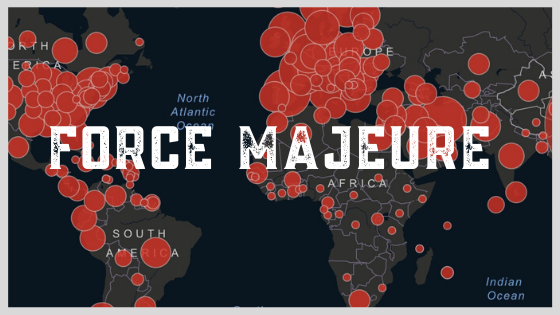In mid-February, during the height of the Coronavirus crisis in China, the China Council for the Promotion of International Trade (CCPIT), a state-run organization, reported that it had issued over 1,600 “force majeure” certificates, in an effort to protect Chinese companies from legal issues related to non-compliance with their contractual obligations. These certificates at the time covered a value of about $15.7 billion. By the first week of March, the number of Chinese force majeure declarations had risen to over 4,800 companies covering contracts worth $53.8 billon.
What is a “Force Majeure” Declaration?
When a company declares “force majeure,” it is invoking a clause, typically noted in its contract with its clients, that states that due to circumstances beyond its control, it is unable to fulfill the terms of the contract.
Invoking the clause is an effort to typically delay or possibly be released from contractual obligations without legal or financial liability. According to one legal definition: “Generally, force majeure refers to the occurrence of an extraordinary event beyond the reasonable control of a party and prevents that party from performing its obligations under a contract.”
Force majeure clauses are common, but vary from industry to industry. On a personal level, property owners may be familiar with mortgage contract language stating various natural disasters or “Acts of God” that can relieve the owner of contractual obligations.
The oil and gas sector and other industries that utilize long-term supply contracts often have extensive force majeure clauses that also include human interventions such as government action, terrorism, war, and strikes that can cause a break in operations beyond the control of one of the parties to a contract.
From industry to industry, and company to company, the details and specificity of force majeure clauses vary widely, and are being tested by the economic disruption wrought by the Coronavirus pandemic. According to one source, “if you’ve seen one force majeure clause, you’ve seen one force majeure clause.”
According to the World Bank, there is no template or standard wording for force majeure clauses or for the events that may or may not cause a force majeure declaration.
While no template exists, global organizations are attempting to introduce some basic standards. For example, the International Chamber of Commerce (ICC) updated its model force majeure contract language only recently (it includes terms like “plague” and “epidemic”).
While these efforts are useful in moving international business toward common terms and language, declarations of force majeure still remain subject to often dueling legal opinions and the decisions of specific courts and arbitrators.
A Legal Burden
According to one analysis, China’s above-noted attempt to offer companies blanket force majeure certificates are likely to be contested legally. One reason noted is that the standard for a force majeure declaration may be different domestically in China than it is internationally – where many trade contracts are based on English common law, in which force majeure events are extensively enumerated and specific.
Some contracts may not contain reference to public health events such as epidemics or pandemics. Additionally, if challenged legally, the burden is on the company making the declaration to prove that the events were unforeseen, unavoidable, and left the company in an impossible situation with no alternatives to meet its contractual obligations. Already, some companies have taken their Chinese counterparts to task, rejecting their force majeure claims and setting up legal battles.
Seek Legal Advice
To avoid costly legal conflict, companies will often seek out a workable solution to avoid a force majeure declaration. The need to work out the details of myriad contractual obligations is said to be one of the main reasons that the International Olympic Committee and organizers of the 2020 Tokyo Summer Olympics took a longer time than most other sports leagues and planners of sporting events to declare a postponement due to Coronavirus.
The input of a trained legal advisor is invaluable when seeking to understand force majeure clauses and tailor contract language that is either specific or broad enough to account for a range of potential events – including public health crisis.
Legal counsel can also help draft language that conforms with both the details of doing business in a specific industry and existing legal precedents concerning force majeure declarations.
Get Proper Coverage
In the current environment, there is considerable likelihood that companies will face a force majeure declaration from either a supplier or buyer, or may even have to contemplate making a such a declaration due to unforeseen and unavoidable circumstances of Covid-19.
In addition to sound legal advice, companies need to have insurance coverage that meets a range of contingencies including force majeure. The team at Securitas Global Risk Solutions has the necessary experience to discuss and advise clients on force majeure and trade credit insurance. If you would like to discuss further, please contact Peter Seneca at 484-595-0100 or email him at pseneca@securitasglobal.com.
Disclaimer: The text above is for informational purposes only, and does not constitute legal advice. Seek the input of a legal practitioner for more detailed information and advice on contract language and force majeure declarations.
Recommended News
UPDATE: For EXIM Clients Affected by Natural Disasters
Image via: The Atlantic The Export-Import Bank of the United States (EXIM) has relief provisions in place for...
ILA 2024: Most Impactful Strike in Decades?
Longshoremen walked off the job at 14 major U.S. East Coast and Gulf Coast ports. The strike, which began at 12:01...
Tupperware Files for Chapter 11 Bankruptcy
Tupperware, known worldwide for its iconic plastic food storage containers, has filed for Chapter 11 bankruptcy. Years...





